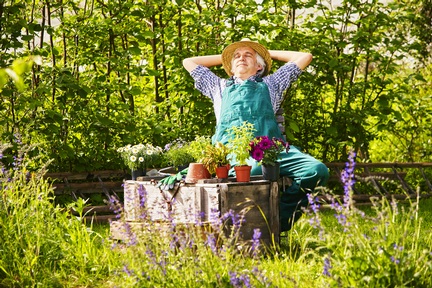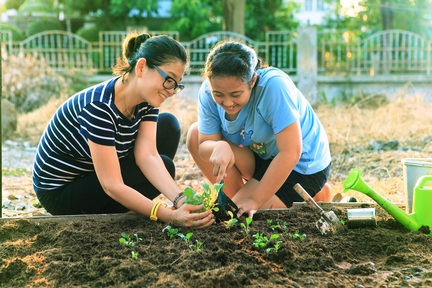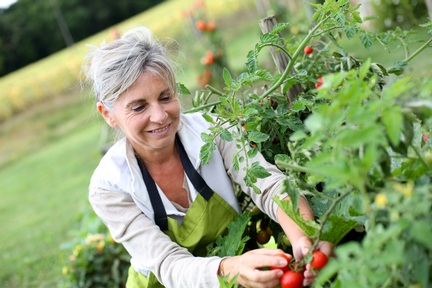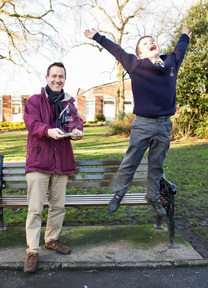Calls for greater recognition of benefits of gardening to improve health and well-being
The benefits of gardening have long been recognised as means of improving both mental and physical health and the latest report published by The Kings Fund is calling for the NHS to introducing gardening to improve people's health and well-being.
The independent report, commissioned by the National Gardens Scheme is calling for the NHS, health professionals, policy makers and local government to recognise the importance of gardening in improving health outcomes.

Published during Dementia Awareness Week 2016, the report highlights the benefits of gardening on both the mind and body and how it could be used in health and social care.
The ‘Gardens and health Implications for policy and practice’ report explores links between gardens, gardening and health and highlights how gardens and gardening can help keep people well and maintain their independence.
Author of the report and senior fellow of public health and health inequalities at The Kings Fund, David Buck, commented: “There is a wealth of evidence that links gardens and gardening with a wide range of health outcomes. We need to build on this evidence, and most importantly get it translated into policy and practice.”
The health benefits of gardens and gardening are broad and far ranging. Gardening can play an active role in promoting good health and preventing ill-health and could have long-term implications for reducing healthcare costs.
Access to gardens and gardening has been linked to reducing depression, loneliness, anxiety and stress and can also benefit people with heart disease, cancer, obesity and dementia by alleviating symptoms, while also improving balance, helping to prevent falls in other people and reducing the number of hospitalisations.
Alternative approaches to improve health and well-being
The report is calling for NHS England and their partners to incorporate the positive role of gardens and gardening in their flagship programmes, including the New Models of Care programme, Healthy New Towns and A Social Movement for Health.

The Kings Fund report says Clinical Commissioning Groups (CCGs) should consider prescribing gardening as a part of a range of alternative approaches to improving health and well-being. The report makes recommendations for local authorities and their partners to consider innovative approaches to sustaining public gardens, such as through new funding models, gardening schemes and community garden on NHS and low-quality public land.
The latest report supports previous research published in October 2015, by researchers at the Universities of Westminster and Essex. They reported the positive impact of gardening could be found across all social classes and suggested that the allotments could help to reduce NHS costs caused by exercise and obesity, as well having a positive impact on self-esteem, depression and overall mental health and well-being. In addition, those tending to allotments tended to be physically fitter than those who didn’t.
MP and Parliamentary Under Secretary of State for Public Health, Jane Ellison, commented: “Gardening improves your mental and physical health – it keeps you active, it can help people with dementia to feel calm and relaxed, and coming together to tend a garden tackles social isolation. This report will be a helpful resource for local areas as they help people to lead healthier lives.”
Almost 90 per cent of UK households have access to a garden and half of the population garden regularly, however, gardens and gardening can be used to enhance people’s health.
Although many hospitals, care homes and healthcare provisions have gardens or offer access to gardens and gardening, the formal use of gardens in England’s health and social care system is limited despite evidence to suggest the promising impact of ‘social prescribing’ gardening and garden projects in hospices.
Social and therapeutic horticulture
Writer, television presenter and president of the National Gardens Scheme, Mary Berry, said: “I have long been aware of the therapeutic benefits of gardening and visiting gardens and how being outside in lovely surroundings, in the fresh air, is so good for our wellbeing. If the report helps to emphasise and give greater understanding of these benefits so that they can be put to wider use for people's health, that would be a great achievement.”

This year’s Chelsea Flower Show focussed on gardens and health with a number of show gardens at the event designed to confirm the wider health and social benefits of gardens and gardening.
The show included the official RHS Garden for the 2016 show, ‘The RHS Greening Grey Britain Garden for Health, Happiness and Horticulture’ which focuses on the healing effects of garden on people’s health. While disability charity Papworth Trust worked with deaf solo percussionist Dame Evelyn Glennie to create the ‘Together We Can’ garden which aims to combine Dame Evelyn’s motto to: ‘teach the world to listen’ and to ‘help to create a world where disabled people are seen for what they can do’.
The practice of using plants to improve physical and psychological health, communications and thinking skills is known as 'social and therapeutic horticulture' and charities such as Thrive use gardening to bring positive changes to the lives of people living with disabilities, ill-health as well as those who are isolated, disadvantaged or vulnerable.
Read the full report, here.
Latest Innovative Care News
 13-May-19
'Pink drink' brain cancer treatment rolled out across NHS in memory of Baroness Jowell
13-May-19
'Pink drink' brain cancer treatment rolled out across NHS in memory of Baroness Jowell
 25-Apr-19
Louis Tomlinson helps 83-year-old who lost wife to dementia complete bucket list
25-Apr-19
Louis Tomlinson helps 83-year-old who lost wife to dementia complete bucket list
 05-Mar-19
Care worker of the year inspires nine-year-old son to work in care
05-Mar-19
Care worker of the year inspires nine-year-old son to work in care
 12-Feb-19
Michael McIntyre's jokes tested to see if they stop elderly catching flu
12-Feb-19
Michael McIntyre's jokes tested to see if they stop elderly catching flu
 25-Jan-19
Ninety-year-old and his dog can stay together, thanks to care worker
25-Jan-19
Ninety-year-old and his dog can stay together, thanks to care worker